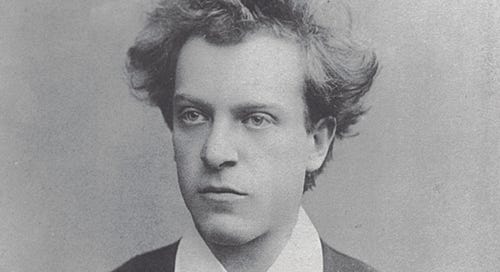“The sad thing is that I leave with so much more to say.”—Béla Bartók
During February, the shortest month of the year, the Daily Classical Music Post will introduce you to (or perhaps reacquaint you with) some composers whose lives were short.
Rott: Symphony No. 1 in E Major - I. Alla breve
Although the Austrian composer Hans Rott (born Johann Nepomuk Karl Maria Rott, 1858–1884) was greatly admired by both Gustav Mahler and Anton Bruckner, he is hardly known at all today. Mahler had this to say about him:
a musician of genius . . . who died unrecognized and in want on the very threshold of his career. . . . What music has lost in him cannot be estimated. Such is the height to which his genius soars in . . . [his] Symphony [in E major], which he wrote as 20-year-old youth and makes him . . . the Founder of the New Symphony as I see it. To be sure, what he wanted is not quite what he achieved. . . . But I know where he aims. Indeed, he is so near to my inmost self that he and I seem to me like two fruits from the same tree which the same soil has produced and the same air nourished. He could have meant infinitely much to me and perhaps the two of us would have well-nigh exhausted the content of new time which was breaking out for music.
Rott was always a bit unstable mentally; he once threatened another passenger on a train with a gun because he thought that Johannes Brahms had filled the carriage with TNT. (There was some animosity between Brahms and Rott, which probably had something to do with the fact that Brahms once told him that he “had no talent whatsoever and . . . should give up music.”) Rott was committed to a mental institution for the last three years of his life, where he received a diagnosis of “hallucinatory insanity, persecution mania—recovery no longer to be expected.” What actually killed him at the age of 25, however, was tuberculosis.
Rott’s Symphony No. 1 in E Major is amazing. You can hear foreshadowings of Mahler in this as well as Rott’s love of Richard Wagner’s music. As Peter Rabinowitz says, “Yes, the symphony looks back as well as forward: As we might expect of a young Bruckner pupil writing at the time, there are lots of reminiscences of Bruckner, Wagner, and the early German Romantics. . . . But in any case, the moments of late-Romantic lingua franca are overwhelmed by Rott’s willingness to go against the grain, to shift direction, to throw in the unexpected gesture, to engage extreme dynamic surprise—and his willingness to push his ideas to the limit. There are a few moments in the first movement that briefly look ahead to the Ives Second—leading us to wonder in what directions his talent might have led him. Not a symphony for those who like their music well mannered, perhaps: But for all its immaturity, it’s a heady work of real genius.” Who knows what he might have achieved had he lived—and, of course, received proper treatment.
My classical music post for today is the first movement (Alla breve) of Hans Rott’s Symphony No. 1 in E Major.




